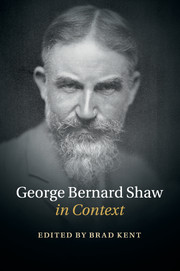Book contents
- Frontmatter
- Dedication
- Contents
- List of illustrations
- Notes on contributors
- Preface
- Acknowledgements
- A Chronology of Shaw's Works
- List of abbreviations
- PART I PEOPLE AND PLACES
- PART II THEATRE
- PART III WRITING AND THE ARTS
- PART IV POLITICS
- 24 Censorship
- 25 Empire and nationalism
- 26 Feminism
- 27 Irish politics
- 28 Socialism
- 29 Totalitarianism
- 30 War
- PART V CULTURE AND SOCIETY
- PART VI RECEPTION AND AFTERLIFE
- Further reading
- Index
- References
30 - War
from PART IV - POLITICS
Published online by Cambridge University Press: 05 October 2015
- Frontmatter
- Dedication
- Contents
- List of illustrations
- Notes on contributors
- Preface
- Acknowledgements
- A Chronology of Shaw's Works
- List of abbreviations
- PART I PEOPLE AND PLACES
- PART II THEATRE
- PART III WRITING AND THE ARTS
- PART IV POLITICS
- 24 Censorship
- 25 Empire and nationalism
- 26 Feminism
- 27 Irish politics
- 28 Socialism
- 29 Totalitarianism
- 30 War
- PART V CULTURE AND SOCIETY
- PART VI RECEPTION AND AFTERLIFE
- Further reading
- Index
- References
Summary
‘To jaw-jaw is always better than to war-war’. Winston Churchill's famous line delivered in June 1954 expresses not only the British wartime Prime Minister's views, but also Bernard Shaw's beliefs about war. Shaw's method of fighting the plague of war was to ‘jaw-jaw’ continually about society's love-hate relationship with war in his plays, essays, and speeches. Shaw wrote many plays that incorporated war as a prominent subject, which is perhaps understandable considering the number of armed conflicts that he lived through. While his war plays – approximately one-third of his dramas – contributed a great deal to his popularity, his polemical writings on the subject often made a pariah of him when his characteristic criticism made him appear unpatriotic and even downright treasonous to the dominant jingoism. Yet Shaw could also support a war when he thought it was just.
Perhaps more than any other nineteenth- and twentieth-century writer, Shaw explores the age-old ambivalence of humankind toward war. Himself a ‘bellicose pacifist’, Shaw both understood and deplored society's fatal love affair with violence, and his plays and essays seek to strip war of its sentimental trappings, while reminding his audiences that war is not melodrama. Society's love/hate relationship with war, war as class struggle, and war as reflecting the gender divide – these ideas constitute a recurring theme permeating Shaw's oeuvre.
Shaw found his political voice as the preeminent essayist for the Fabian Society. One of seven essayists chosen to defend Fabian principles, he wrote numerous essays on topics ranging from rent to world commerce, gaining fame as the editor of the surprisingly popular Essays in Fabian Socialism, which sold thousands of copies and went through several reprints. Primarily because of the success of this publication, the group chose Shaw to edit the Society's response to the second Boer War, Fabianism and the Empire: A Manifesto by the Fabian Society. The Society published this work despite the lack of consensus among Fabians regarding the second Boer War specifically and the justness of war in general. This manifesto critiqued the merits and demerits of internationalism, a topic that engaged Shaw's interest throughout his long life. Quite early he intuited that patriotism and nationalism fuelled society's ever-readiness for war and that a truly international spirit provided a solution to curbing humankind's tendencies toward aggression.
- Type
- Chapter
- Information
- George Bernard Shaw in Context , pp. 246 - 252Publisher: Cambridge University PressPrint publication year: 2015



